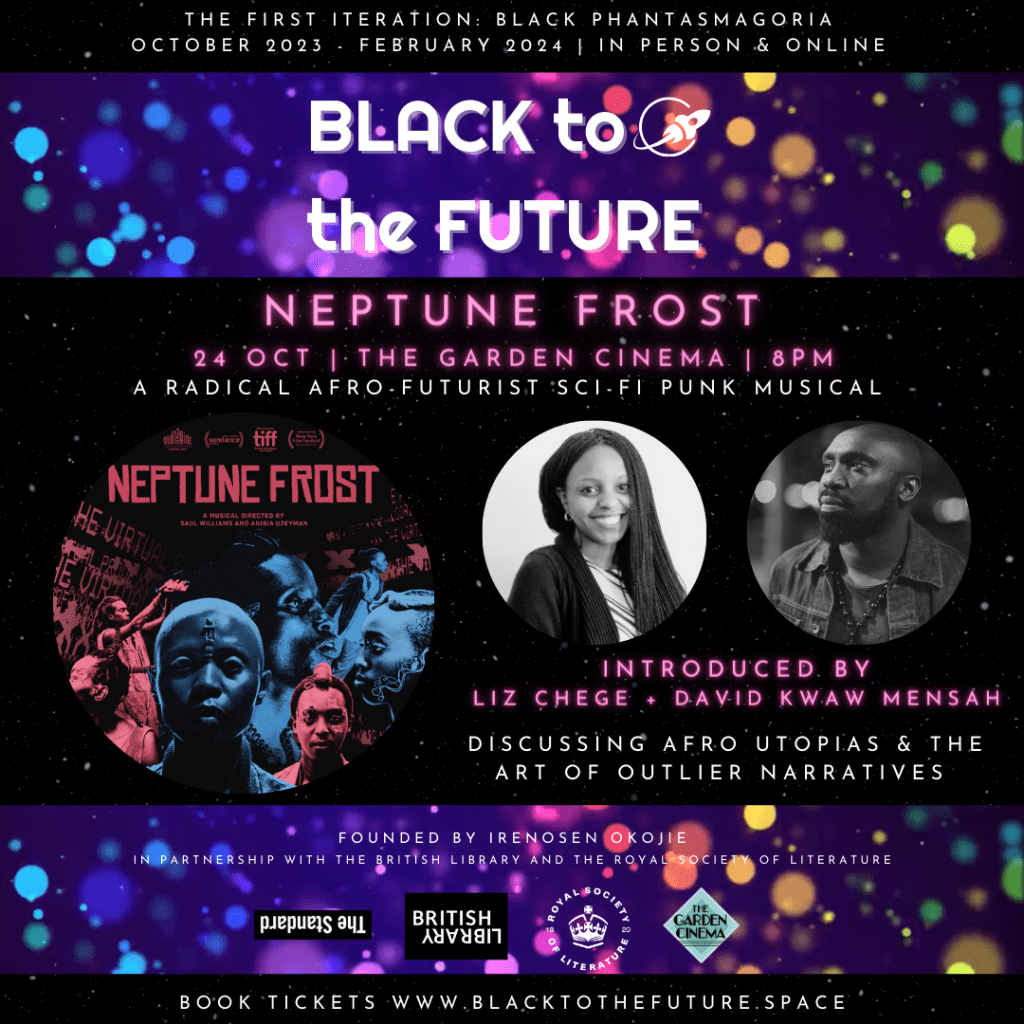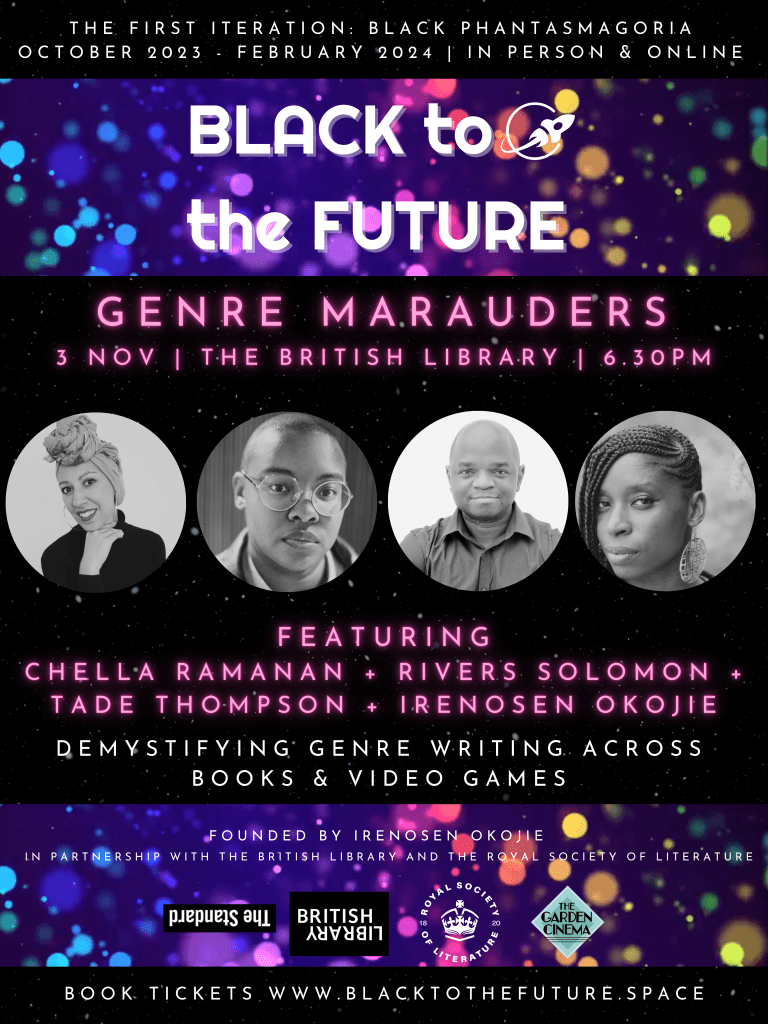In the world of literature, cinema, and art, Afrofuturism has emerged as a powerful and visionary movement, offering a glimpse into a future seen through a Black lens. “Black to the Future” (BttF) is a groundbreaking festival of outstanding Black artists, a creative space where visionary imaginings can thrive. This event, curated, founded, and directed by the esteemed Irenosen Okojie MBE, in collaboration with the Royal Society of Literature and the British Library, promises to be a cultural highlight.
Sara Veal, the creative director of BttF, shared her insights and excitement about this unique festival with us at How To Be Books. She noted, “This is what happens when writers put together an event at the British Library.” Veal explained that the concept for BttF was conceived by Okojie back in 2020, just before the pandemic disrupted the world. Okojie’s vision was to create an expansive festival that would explore Afrofuturism, a concept deeply rooted in her interests.
What are the main ideas of Afrofuturism?
Afrofuturism, a cultural aesthetic and philosophical movement rooted in science fiction, delves into the African diaspora's intricacies through diverse mediums, including literature, music, art, and film. This visionary movement draws on African mythology, history, and culture to envision potential futures for people of African descent, celebrating and affirming their experiences. Key Afrofuturist concepts encompass a reverence for African culture and history, where these elements provide the foundation for storytelling and futuristic visions. It emphasises technology's potential to liberate and empower individuals of African descent, advocating for a more equitable future. Additionally, Afrofuturism explores themes of interconnectedness, touching upon subjects like environmentalism, pan-Africanism, and the unity of humanity. Notable Afrofuturist works span various creative realms, including literature (Octavia E. Butler's "Xenogenesis" trilogy, N.K. Jemisin's "Broken Earth" trilogy, Nnedi Okorafor's "Binti" trilogy), music (Sun Ra, Janelle Monáe, Flying Lotus), art (Kara Walker, Wangechi Mutu), and film ("Black Panther," "Us," "Sorry to Bother You"). Afrofuturism, a dynamic and evolving cultural phenomenon, defies a singular definition, but its core ideas offer an empowering perspective on the African diaspora's experiences and humanity's future.
However, the initial plans were put on hold as the world navigated through unprecedented challenges. Veal underwent a significant career change, moving from her role as head of communications at a co-working space for writers to the world of video games. This change brought a unique perspective to BttF, as she aimed to incorporate elements of video game culture wherever possible.
The collaborative spirit: bringing together diverse voices
Veal emphasised the importance of bringing together people from different realms to engage in thought-provoking conversations. As a result, BttF’s programming is designed to encourage interdisciplinary discussions and collaborations, transcending boundaries to create something truly unique.


One of the festival’s first events is a screening of Saul Williams’ Afro-punk sci-fi musical, “Neptune Frost,” accompanied by introductions from photographer David Kwaw Mensah and Liz Chege, who will delve into discussions about Afro utopias. Another flagship event in collaboration with the British Library, titled “Genre Marauders,” features renowned authors like Tade Thompson, Chella Ramanan, and River Solomon, chaired by Okojie, exploring genre writing in books and games.
While the “Black to the Future” festival primarily focuses on Black excellence, it also takes an intersectional approach, spotlighting creatives of colour from various backgrounds. Veal herself, being half Filipino, appreciates the festival’s inclusivity and the opportunity to bring diverse voices to the forefront.
Read: Africa Writes: Claudia Rankine among writers at heritage event
Afrofuturism, as Veal explained, is about envisioning the future through a Black lens, often with a positive outlook and a focus on alternate histories. It seeks to challenge the predominantly white perspective of the future that dominates much of the science fiction genre.
“I mean, sci-fi is often very white. There’s often a very white sort of kind of particular vision of the future. And it comes through a very white lens. Afrofuturism flips that. It imagines a future through a black lens, but usually with a very kind of positive outlook involving alternate histories.”
Sara Veal, Black to The Future Creative Director
BttF aims to break new ground by creating a dynamic and open-ended space for Afrofuturism. Veal described it as a “reverse tokenism,” where the festival gives the whole space to creatives of colour to explore and innovate freely.
Beyond expectations: the overwhelming response to BttF
Unsurprisingly, the response to BttF has been overwhelming, having exceeded the expectations of its organisers. Hence Veal expressed her gratitude for the people they’ve met and the support they’ve received from various collaborators, venues, and culture teams. The festival’s success is also attributed to partnerships and the enthusiasm of those who believe in its mission.
“We didn’t quite know what would happen when we made the initial announcement, but even before we made the announcement, talking about what we wanted to do, and the way people responded to that. So, this is how we actually ended up working with the British Library.”
Sara Veal, Black to The Future Creative Director
The journey ahead: a five-month cultural extravaganza
BttF runs from late October 2023 to the end of February 2024, with events at multiple venues, including the British Library, the Standard Hotel, and the Garden Cinema. The organisers have worked diligently to capture a diverse range of voices and topics, making it an event to remember.
As Veal summarised, “Our aim is to put on a display of the breadth of Black excellence across different industries and to create new connections between the people that we put together for particular events, but also the people who come to them.” They also prioritise recording events for future access and documentation, as well as plan to run the event in a biennial, hybrid capacity.
In the end, “Black to the Future” is more than just a festival; it’s a movement, a celebration, and a journey into the boundless possibilities of Afrofuturism and Black creativity.
If you want to stay updated on “Black to the Future,” then please visit their website at www.BlackToTheFuture.Space and follow them on Twitter and Instagram. Veal and the entire BttF team look forward to welcoming audiences to this extraordinary celebration of Black excellence and Afrofuturism.
[…] British Library hosted a recent panel event for the inaugural Black to the Future Festival, which looked at the topic of Afrofuturism in the sphere of science fiction, ahead of the […]
[…] and high-quality editing. The initiative involves a team of genre-specific curators including Irenosen Okojie for fiction, Will Harris for poetry, Colin Grant for non-fiction, and others for different genres, […]